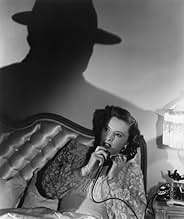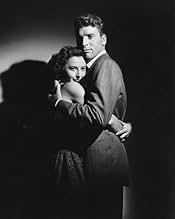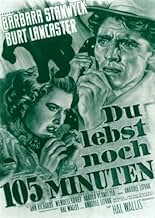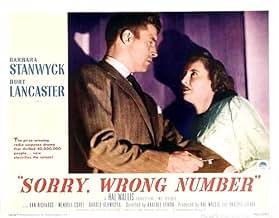VALUTAZIONE IMDb
7,3/10
13.491
LA TUA VALUTAZIONE
Mentre è al telefono, una donna invalida ascolta quello che lei pensa sia un complotto di omicidio e cerca di prevenirlo.Mentre è al telefono, una donna invalida ascolta quello che lei pensa sia un complotto di omicidio e cerca di prevenirlo.Mentre è al telefono, una donna invalida ascolta quello che lei pensa sia un complotto di omicidio e cerca di prevenirlo.
- Candidato a 1 Oscar
- 3 vittorie e 3 candidature totali
Bill Cartledge
- Page Boy
- (non citato nei titoli originali)
Cliff Clark
- Police Sergeant Duffy
- (non citato nei titoli originali)
Joyce Compton
- Cotterell's Blonde Girlfriend
- (non citato nei titoli originali)
Ashley Cowan
- Clam Digger
- (non citato nei titoli originali)
Yola d'Avril
- French Maid
- (non citato nei titoli originali)
Suzanne Dalbert
- Cigarette Girl
- (non citato nei titoli originali)
Recensioni in evidenza
An expanded radio play and subsequent TV drama, this film builds terrific tension around a bedridden heiress and her telephone.
Sympathy builds for this unlikeable woman, Leona, played by Barbara Stanwyck. She is a spoiled heiress used to getting her own way, but as we come to see, very much created by her father (played by Ed Begley) who bows to all her wishes.
Her husband, Henry, played by Burt Lancaster, whom she chases and captures from her best friend, initially goes along with being an employee in her father's corporation but eventually starts chafing at the restraints imposed on him.
The movie just about plays in real time with the addition of many flashbacks, one of which secures the knowledge that there is nothing wrong with Leona, it is all psychosomatic based on her mother's fatal illness.
From the moment Leona accidentally overhears a plotted murder for later on that evening, the viewer is taken on a ride that builds suspense and tension to a terrifying conclusion and the movie's title.
Not to be missed. The cinematography is superb, a lot of play in light and shade. Barbara deserved an Oscar but lost. 8 out of 10.
Sympathy builds for this unlikeable woman, Leona, played by Barbara Stanwyck. She is a spoiled heiress used to getting her own way, but as we come to see, very much created by her father (played by Ed Begley) who bows to all her wishes.
Her husband, Henry, played by Burt Lancaster, whom she chases and captures from her best friend, initially goes along with being an employee in her father's corporation but eventually starts chafing at the restraints imposed on him.
The movie just about plays in real time with the addition of many flashbacks, one of which secures the knowledge that there is nothing wrong with Leona, it is all psychosomatic based on her mother's fatal illness.
From the moment Leona accidentally overhears a plotted murder for later on that evening, the viewer is taken on a ride that builds suspense and tension to a terrifying conclusion and the movie's title.
Not to be missed. The cinematography is superb, a lot of play in light and shade. Barbara deserved an Oscar but lost. 8 out of 10.
Sorry, but 'Sorry, Wrong Number' loses a lot in its transition to the screen. For one thing, there are too many flabby flashbacks--a form quite popular in the '40s but used extensively in this film, ad nauseum. All of the suspenseful action in the bedroom of the bedridden victim is held at bay while we watch another endless flashback attempting to show us how selfish and unworthy this woman is. If you heard the original radio drama with Agnes Moorehead giving a spine-chilling portrait of Leona, you'll see why the film becomes too diffuse in an attempt to give us "filler material". The fact that Lucille Fletcher adapted her own work for the screen would give the viewer hope that this is going to be just as good as the radio drama--but it's not. Barbara Stanwyck gives an excellent performance, bordering on hysteria toward the finale--but it's an actressy performance and not as controlled as some of her other film noir roles. Burt Lancaster has a colorless role and can't do much with it. Ann Richards is impressive as the woman who tries to warn Leona. By expanding the plot outside the bedroom, Fletcher created a confusing number of sub-plots that simply take away from the tension. Too much padding actually hurts the film. Anatole Litvak's direction is strong--but not strong enough to put the film on the same level with the classic radio drama. The plot is overcomplicated to the nth degree.
Trivia note: The only other film with such heavy use of flashbacks to tell a complicated story is THE LOCKET ('47), but it was done more efficiently than it is here.
Trivia note: The only other film with such heavy use of flashbacks to tell a complicated story is THE LOCKET ('47), but it was done more efficiently than it is here.
Chrome-plated hokum, Sorry, Wrong Number works despite itself. And works and works. Starting out as a radio drama by Lucille Fletcher in the 1940s, it boasted umpteen performances plus a 1946 production in the nascent medium of television before Anatole Litvak turned it into film noir. During most of its earlier incarnations, Agnes Moorehead created the role of the hysterical, bedridden heiress, the `cough drop queen,' but the film fell into the lap of the First Lady of Film Noir, Barbara Stanwyck. Moorehead was more than a strong enough actress, but Hollywood required a star.
The Irony is that Sorry, Wrong Number is far from her finest hour on screen. Rarely has one been made so aware of Stanwyck `acting' in the most unabashedly actressy way. And the same can be said of Burt Lancaster who, when a role didn't set well with him, communicated his discomfort blatantly. In The Rose Tattoo, against Anna Magnani, he was ingratiating and unconvincing ; here, he's almost as awkward as the henpecked husband in whom the worm has at long last turned.
But maybe Fletcher's slice of devil's food cake calls for mannered histrionics. Ensconced in her bedchamber one sweltering Manhattan evening, her pill bottles and her telephone at her elbow, Stanwyck eavesdrops on a sinister conversation a murder is being plotted thanks to a crossed line. This makes her even more restive, and she starts working the phone, tracking down her tardy husband. Litvak `ventilates' these calls, turning them into a series of flashbacks filling in the background to what will prove a very bad evening for Stanwyck. (The sequences on Staten Island, however, could have sprung from the pen of Franklin W. Dixon, the Hardy Boys' puppeteer.)
Unavoidably talky, owing to its source, Sorry, Wrong Number moves inexorably to its preordained end. Basically, it's a gimmick, and one that Hitchcock might have fine-tuned into a nifty infernal machine. Litvak doesn't do badly, though, and the movie's shock value outlasts its staled conventions. Its most chilling moment comes when Stanwyck frantically dials a number that she thinks will give her solace. But her answer is `BOwery 2-1000 the City Morgue.'
The Irony is that Sorry, Wrong Number is far from her finest hour on screen. Rarely has one been made so aware of Stanwyck `acting' in the most unabashedly actressy way. And the same can be said of Burt Lancaster who, when a role didn't set well with him, communicated his discomfort blatantly. In The Rose Tattoo, against Anna Magnani, he was ingratiating and unconvincing ; here, he's almost as awkward as the henpecked husband in whom the worm has at long last turned.
But maybe Fletcher's slice of devil's food cake calls for mannered histrionics. Ensconced in her bedchamber one sweltering Manhattan evening, her pill bottles and her telephone at her elbow, Stanwyck eavesdrops on a sinister conversation a murder is being plotted thanks to a crossed line. This makes her even more restive, and she starts working the phone, tracking down her tardy husband. Litvak `ventilates' these calls, turning them into a series of flashbacks filling in the background to what will prove a very bad evening for Stanwyck. (The sequences on Staten Island, however, could have sprung from the pen of Franklin W. Dixon, the Hardy Boys' puppeteer.)
Unavoidably talky, owing to its source, Sorry, Wrong Number moves inexorably to its preordained end. Basically, it's a gimmick, and one that Hitchcock might have fine-tuned into a nifty infernal machine. Litvak doesn't do badly, though, and the movie's shock value outlasts its staled conventions. Its most chilling moment comes when Stanwyck frantically dials a number that she thinks will give her solace. But her answer is `BOwery 2-1000 the City Morgue.'
Heck of a thriller, though the narrative is difficult to piece together at times. Stanwyck gets to run through a gamut of hysterical emotions as the intended victim. Her Leona is not particularly likable as the rich man's daughter who gets her way by bullying people around her. So there's some rough justice in her predicament—alone, disabled and dependent on the phone while a killer seemingly stalks her. Even the independent working-man, a studly Henry (Lancaster), is bullied into taking up with her. Of course, it doesn't hurt that she's got scads of money to assist her schemes. Incidentally, catch how Henry's several capitulations to others (Leona, Morano) are marked by allowing them to light his cigarette. Nice touch.
The idea of only gradually revealing why Leona is being set up for murder is a good one. It adds to the suspense—not just a 'when' but also a 'why'. The trouble is the disclosure is only revealed in pieces over the phone using flashbacks, and these are hard to piece together over a stretch of time. But enough comes through that we get the idea. There's some great noir photography from Sol Polito that really adds to the tense atmosphere. Anyhow, it's a great premise that also played well over the radio that I recall as a kid. It's also a subtle irony that one could end up being so alone in the middle of a great city. Poor Leona, maybe if she had been a little nicer and less bossy over the phone, she might have made the human connection she needed.
The idea of only gradually revealing why Leona is being set up for murder is a good one. It adds to the suspense—not just a 'when' but also a 'why'. The trouble is the disclosure is only revealed in pieces over the phone using flashbacks, and these are hard to piece together over a stretch of time. But enough comes through that we get the idea. There's some great noir photography from Sol Polito that really adds to the tense atmosphere. Anyhow, it's a great premise that also played well over the radio that I recall as a kid. It's also a subtle irony that one could end up being so alone in the middle of a great city. Poor Leona, maybe if she had been a little nicer and less bossy over the phone, she might have made the human connection she needed.
Barbara Stanwyck (as Leona Stevenson) is a neurotic woman, confined to her bed. She is married to the very attractive, and mysterious, young Burt Lancaster (as Henry Stevenson). Ms. Stanwyck relies on a state-of-the-art 1940s corded telephone to help communicate her needs. One evening, she picks up her phone and overhears two men plotting a murder; eventually, the crime moves too close to Stanwyck for comfort
Stanwyck is excellent as the spoiled, arrogant, and wealthy, but, ultimately, helpless heroine of Lucille Fletcher's adapted radio play (the part was originated on radio by Agnes Moorehead). The story picks up some flaws in its extension into a feature film; it is most frustrating as (flashbacks) ((within flashbacks)) (((within flashbacks))) occur; and, the story becomes a little confusing. Still, Stanwyck's fine performance carries the film to an exciting, tense, conclusion.
******** Sorry, Wrong Number (9/1/48) Anatole Litvak ~ Barbara Stanwyck, Burt Lancaster, Wendell Corey
Stanwyck is excellent as the spoiled, arrogant, and wealthy, but, ultimately, helpless heroine of Lucille Fletcher's adapted radio play (the part was originated on radio by Agnes Moorehead). The story picks up some flaws in its extension into a feature film; it is most frustrating as (flashbacks) ((within flashbacks)) (((within flashbacks))) occur; and, the story becomes a little confusing. Still, Stanwyck's fine performance carries the film to an exciting, tense, conclusion.
******** Sorry, Wrong Number (9/1/48) Anatole Litvak ~ Barbara Stanwyck, Burt Lancaster, Wendell Corey
Lo sapevi?
- QuizAnatole Litvak: Where Henry is having lunch with Sally, he asks his waiter if he knows who the gentleman is in the dark glasses at the table behind him. It is the director.
- BlooperTwice, Leona turns on a radio, and music begins instantly and strongly. Radios of the film's era contained vacuum tubes that needed some time to warm up.
However, this would be filmmaker's prerogative, not wanting to slow the pace of the film with extended silence.
- Citazioni
Henry Stevenson: [to Leona] I want you to do something. I want you to get yourself out of the bed, and get over to the window and scream as loud as you can. Otherwise you only have another three minutes to live.
- Curiosità sui creditiPROLOGUE: "In the tangled networks of a great city, the telephone is the unseen link between a million lives...It is the servant of our common needs-the confidante of our inmost secrets...life and happiness wait upon its ring...and horror...and loneliness...and...death!!!"
- ConnessioniEdited into Il mistero del cadavere scomparso (1982)
I più visti
Accedi per valutare e creare un elenco di titoli salvati per ottenere consigli personalizzati
- How long is Sorry, Wrong Number?Powered by Alexa
Dettagli
- Data di uscita
- Paese di origine
- Lingua
- Celebre anche come
- Al filo de la noche
- Luoghi delle riprese
- Hollywood, California, Stati Uniti(telephone switchboard at a telephone company office on Gower St.)
- Azienda produttrice
- Vedi altri crediti dell’azienda su IMDbPro
Botteghino
- Lordo in tutto il mondo
- 1974 USD
- Tempo di esecuzione1 ora 29 minuti
- Colore
- Proporzioni
- 1.37 : 1
Contribuisci a questa pagina
Suggerisci una modifica o aggiungi i contenuti mancanti




































